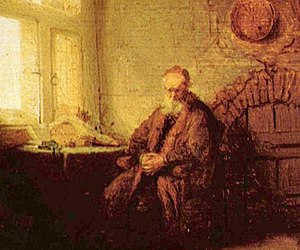 Image via Wikipedia
Image via WikipediaSomerset Maugham summed up what I want to do in Of Human Bondage when considering the philosophical journey the central character, Philip Carey, was to undergo in the book.
"The thing then was to discover what one was and one's system of philosophy would devise itself. It seemed to Philip that there were three things to find out: man's relation to the world he lives in, man's relation with the men among whom he lives, and finally man's relation to himself."
So that's what I need answers to. But in a philosophical sleight of mind, I'm going to turn the question around to make it more tractable. Instead of looking for the meaning of life I want to consider how to give life meaning.
The story is set during the inter-war years when questions of what constituted a meaningful life were at their most acute. It was a time of class conflict, war, economic depression and epidemics. It's an interesting period to write about because choices were so stark. So much so that staying silent or taking no action was viewed as complicity.
Modernism had its birth during this period and it, amongst other things, was about setting itself against the authorities of the past and finding a new way of being. The literature of the time tended to concentrate on the individual and their attempts to preserve themselves in the face of vast and indifferent social and natural forces. It was marked by the acknowledgement of those forces, antipathy towards them and a desire to avoid the traps they set.
Ally this to morality of the modernists and you get a recipe for a meaningful life that is defined by action. Taking part, actively throwing over what has gone before becomes important. Finding and trying new ways to do things, even if the end result is questionable, is key to a good life in this time. Modernism seems keen to avoid any moral judgement on this philosophy. So people working to bring about a socialist or fascist state are both, under this approach, meaningful ways to live.
What helps with the story is that action, doing, is key. Sometimes the actions are in service of a cause, at others just to satisfy an individual. It also has to be an engagement that is total. There can be little place for the detached observer. Living rather than thinking is the more important part. It should be the case that only by looking back will it be possible to see the pattern such a life has woven. The life has to be lived without any consciousness not carefully shaped and fabricated. Be in it rather than above it.
The tenor of the inter-war years, the sheer pace of history that crashed over the period made it easier to engage with life. The various conflicts of the time, social and military, also made it hard for people to stop and philosophise about what they were doing. No matter what people did - protest, fight, work or stay silent - there were consequences to their actions or lack of them.
I also want to salt this with some of the sentiment from Sartre's Existentialism and Humanism (which was pre-figured in a lot of modernist literature as far as I can see) which tries to reveal the heroic in the stance of someone who knows the universe is indifferent but goes on with his life. As he writes, existentialism is not supposed to be about navel gazing. It is about responsibility. Do not blame your cowardice, bravery or morality on nature or nurture. Seize its implications and embrace the act. Heroes make themselves heroic, they have no-one else to blame. Nor do cowards. Nor does anyone. Make your choices and act.


No comments:
Post a Comment